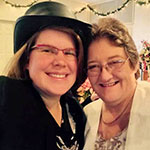
Photo by nathanmac87 / CC BY 2.0
The undisturbed surface of the communion wine forms concentric circles when hit by a single tear. The symbol for the blood of Jesus Christ himself—blood that was given in an act of radical love for the everlasting unity between us and God—trembles with shock on this Sunday morning. It wasn’t the only tear.
Making sense of the senseless
We are at a Metropolitan Community Church, a congregation with a specific outreach to the LGBT community. Most people in the room identify as gay, lesbian, bisexual, or transgender.
The younger ones in the church, those who believed that winning the right to marry ended a decade-old gay civil rights movement, are shocked into helpless rage and sickening grief. Their tears flow bitterly and with the sudden fear of a child who understands for the first time that they are not loved by everyone.
Then, there are the older congregants who have been through so much more than the young ones can imagine. Seasoned warriors who have been thrown into jail for dancing with someone of the same sex. Who, during the AIDS crisis, had to take care of the bodies of their dear friends themselves because even hospitals would turn them away. They shed tears, too.
These tears, however, are strangely different. There is a certain resignation in them, almost a routine. Witnessing another vicious crime against their siblings opens old wounds, triggers old memories, and reminds them what being victimized feels like. It is a familiar feeling to all of them.
They begin to warn the younger ones once again: “That is why we tell you: Always be aware of who is around you.” What sounded like unnecessary paranoia from days long past, becomes sudden truth and the best piece of advice they can give.
More than victims
How does a whole congregation of LGBT people react to the hate crime in Orlando? How do people who fiercely believe in God’s love and forgiveness for every single human being reconcile their beliefs with the feelings they surely have for the man who murdered their siblings?
LGBT Christians always dance on the line between the worlds. As a part of the LGBT community, they are misunderstood for supporting a system that is seemingly against them. As a part of the Body of Christ, they are confronted with hatred and cast out of many major denominations. So how do they position themselves on a Sunday like this?
“Lord,” they pray in the old words of Francis of Assisi, “Make us an instrument of your peace. Where there is hatred, let us sow love. Where there is injury, pardon. Where there is doubt, faith. Where there is despair, hope. Where there is darkness, light. Where there is sadness, joy. Lord, grant that we may not so much seek to be consoled as to console. To be understood as to understand. To be loved as to love. Amen.”
Standing in the blood of their siblings, they ask for forgiveness for the shooter and beg God to show them how to love more radically, more inclusively. No, these people are not victims. If anything, they are Warriors of Love.
Proud and unbroken
As we drive home, we pass a huge flag outside a restaurant. Today it is at half-mast. The eyes of my wife fill with tears. She feels recognized in her pain and helplessness. She feels that the country mourns with our community. She knows that her country is, despite everything, not a homophobic country. She realizes that there is no room for fear and despair, but instead for unashamed pride. She grabs my hand. Her voice is full of love when she says: “I’d rather be shot for holding your hand, than not holding your hand at all.”
 About Franziska Garner
About Franziska Garner
Franziska Garner was born and grew up in Germany. In September 2015 she moved to the United States and married her partner Lisa. Together they are building a ministry (www.wetfeetministry.com) with a special outreach to the LGBT+ community.
Leave a Reply